

When protest is branded “terrorism”
by Paul Cudenec | Apr 25, 2023
Just a month ago, I felt the need to distance myself from a dystopian future I had once described in a fictional work.
I explained, rather apologetically, that at the time I had envisaged the post-9/11 “terrorism” bugbear still being the system’s fear-weapon of choice, rather than viruses or the weather, as was now the case.
However, I think I may have spoken too soon!
With the Covid excuse wearing impossibly thin, it seems that the global governance is reverting back to “anti-terrorism” as a principal pretext for removing our rights and our freedom.
French interior minister Gérald Darmanin has this month been describing opposition to the widely-detested Macronist regime as “intellectual terrorism”.
Moreover, last week I reported from a protest in the Hérault department of France at which the authorities used “anti-terrorist” laws to ban the banging of saucepans, though it didn’t really work!
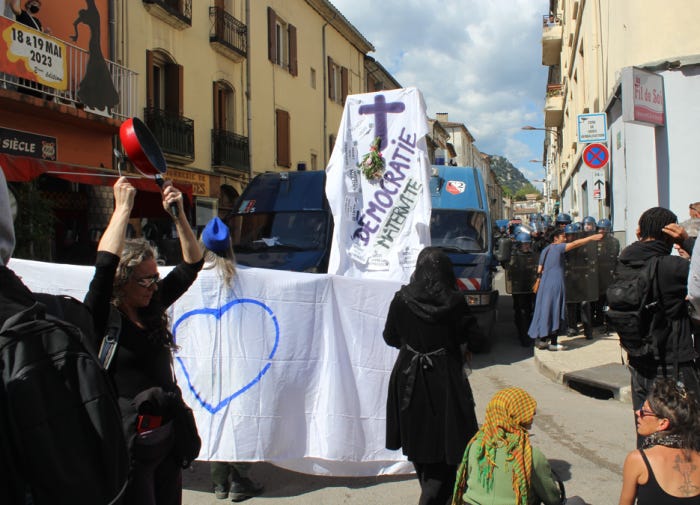
A similar decree, again based on “anti-terrorist” legislation, was used by the Loir-et-Cher department to outlaw protest and noise-making around Macron’s visit on Tuesday April 25.
This is clearly a strategy that has been decided at a higher level than the merely regional.
Meanwhile, on Monday April 17, Ernest Moret, a young French publisher, was detained by UK police on arriving by train at St Pancras station in London under Section 7 of the Terrorism Act 2000.
He was questioned for six hours, had his phone and laptop seized, and was then arrested for alleged obstruction in refusing to disclose the passcodes to his devices.
The justification for all this was that he “had participated in demonstrations in France”.
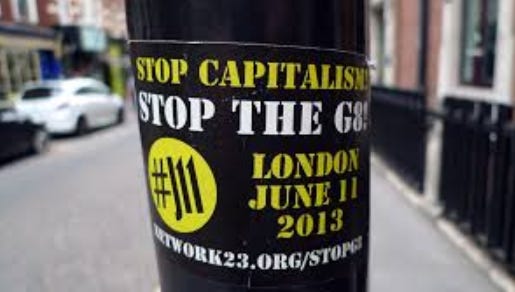
Ten years ago I was detained under the same law on leaving the ferry at Dover, in connection with the Carnival Against Capitalism being staged in London by the Stop G8 network, of which I was part.
Schedule 7 makes it a crime not to provide information to an officer if the questions are intended to investigate ‘terrorism’.
But a fellow campaigner and I refused to comply, insisting that the police’s questions were, instead, targeting political dissent.
The use of Section 7 against protesters has been going on for while, as this 2006 report illustrates.
“Is It Really About Terrorism?” asked the heading to the article, and the answer is clearly still “no”.
The common factor to all these cases is, in fact, protest – protests against the global money-power, its gatherings and its stooges.
The term “terrorism” has been deliberately twisted out of all recognition in order to smear political dissent and to judicially enable police-state repression of protest.
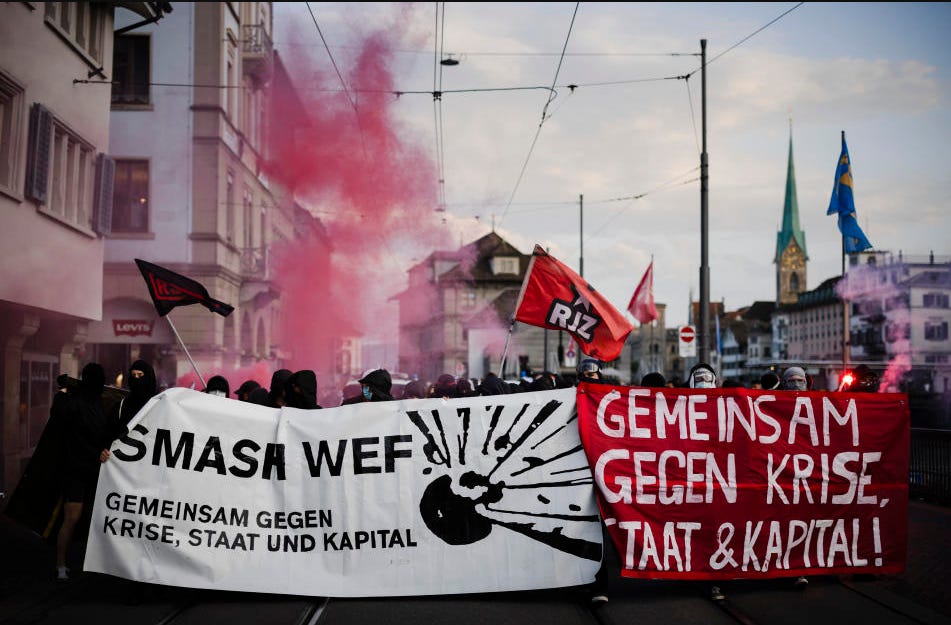
We have been covering this issue for some time on the Winter Oak site.
In 2015 we summarised an important article from Guccio, an international radical magazine.
This explained that “anti-terrorism” was not at all what it seemed, but part of a global psychological war waged against most of humanity by a small controlling gang.
The authors said that the idea that anti-terrorist laws were a reaction to actual “terrorist” threats was false.

“It is known that among the 11 proposals for international anti-terrorist legislation submitted by the EU during the autumn of 2001 ‘in reaction to 9/11’, six had already been formulated before the attacks, four were already in preparation and only one, concerning asylum and immigration, was actually new.
“We also know that the UK, one of the main engines behind this whole process, had already passed the Terrorism Act 2000 which, without saying so openly, was aimed at ‘subversive’ political movements, mainly the anti-globalisation movement”.
That is, of course, the very legislation used last week against the aforementioned Ernest, a “subversive” who had dared protest against France’s president, an all-too-obvious puppet of the global money-power.
The worldwide control of the financial power nexus, so evident to so many since 2020, was identified in the Guccio article.
The opposition, once called “the anti-globalisation movement” and now perhaps “the freedom movement”, was failing because it kept on fighting repression on the national level “whereas it represents a global policy”, they wrote.
They also suggested that the way we conducted our struggles could help undermine the absurd smear of “terrorism”.
“When their tactic consists in ascribing a feeling of terror to any revolutionary movement, we must make people laugh, mock our enemies, show a great deal of wit. A funny terrorist is already not a terrorist any more”.
They said that the “anti-terrorist” establishment had long tried to associate opposition to the system with a feeling of fear, whereas the feeling for those on the streets was one of liberation.
They wrote: “It is crucial to break this spell… spark complicity. Bind together once again the idea of revolution with the idea of increasing power, of joy”.
When “anti-terrorist” laws are deployed against people banging pots and pans and when this merely provokes mockery and further saucepan-related protest, we may be setting off on the right path to exploding the “anti-terrorism” scam.

But this is likely to be a painful journey, since the global empire of greed will stop at nothing to hold on to its power.
Historical moments of impending mass liberation have a strange tendency to be interrupted by some kind of emergency…
Does the renewed use of “anti-terrorist” excuses mean we can expect a resumption of terror attacks, after a period when they mysteriously became as rare as cases of old-fashioned influenza?
If so, our critique of fake “anti-terrorism” is going to have to include an understanding of actual terrorism, not least NATO’s notorious Gladio network.
And we would do well to bear in mind the wise words of Gianfranco Sanguinetti in his book On Terrorism and the State, published more than 40 years ago.
He wrote: “I have never said that the secret services were behind every single attack, given that these days even a Molotov cocktail or a workplace sabotage are considered to be ‘attacks’: but I have said, and I have been saying for nearly ten years now, that all spectacular acts of terrorism are either remote-controlled, or directly carried out, by our secret services”.


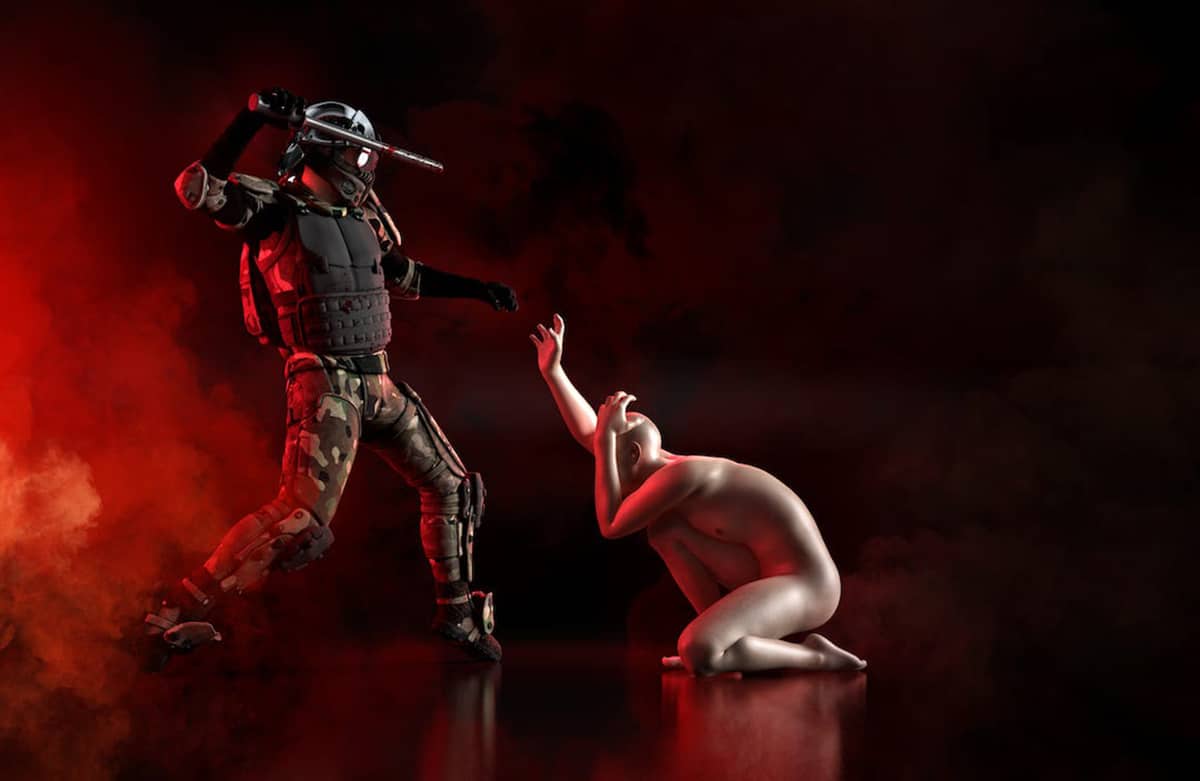

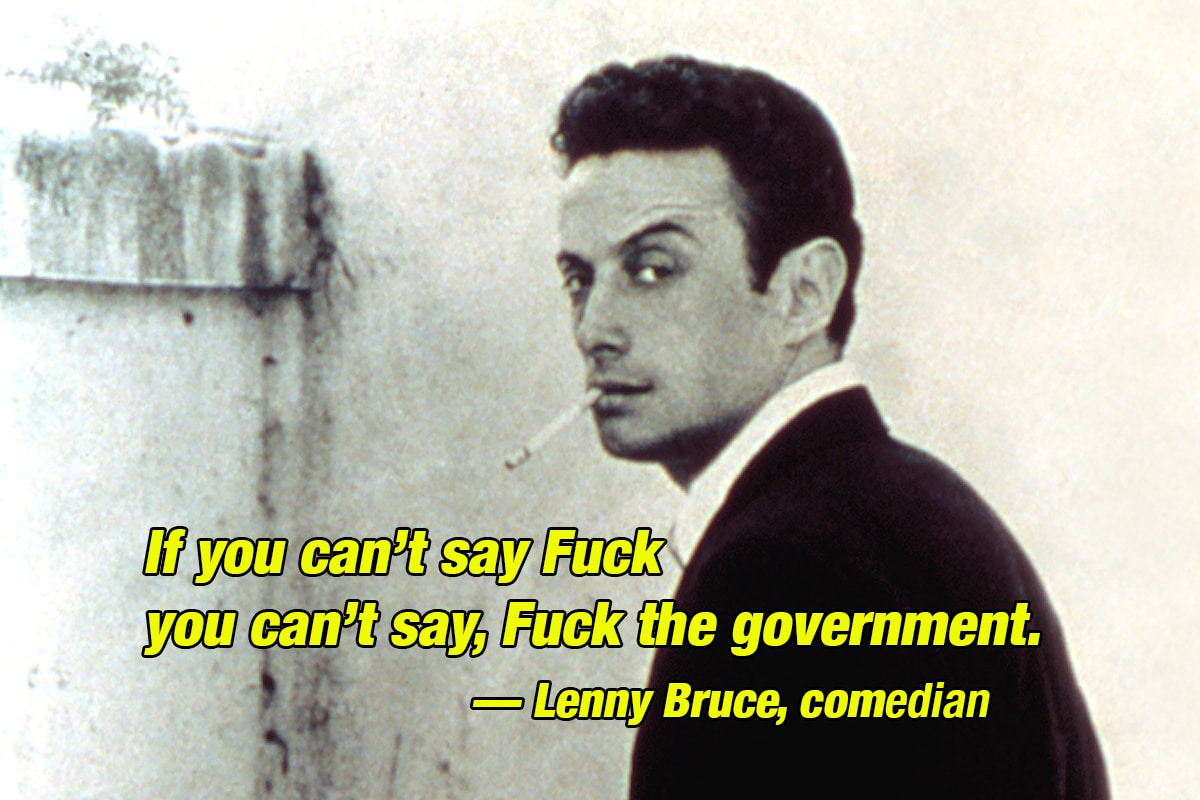
0 Comments